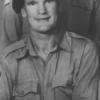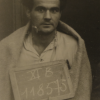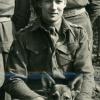Report about the experience of the 6th Platoon S Company of the 1st Para battalion by : Captain Richard Bingley.
It was my privilege to command 6 Platoon of "S" Company 1st Battalion The Parachute Regiment at Arnhem. Those of us who were wounded the previous year in the Parachute Operation in Sicily had re-joined and the Platoon was back at full strength. We were well trained and morale was high. Sadly 12 of the Platoon were to die at Arnhem and 18 were wounded, in what proved to be a rather one sided battle with the Germans holding all the trump cards.
In the early hours of Sunday, 17th September, 1944, the Platoon emplaned in two C 47 Dakota Aircraft at Folkenham Airfield, Lincolnshire, and we had an uneventful flight to Holland, safely escorted by a huge number of British and American Fighter Planes.
At 1300 hours the "red" light above the door exits, changed to "Green" and we had a speedy exit with safe landings at Wolfheze. Once out of our parachute harness, we rendezvoused by 1st Battalion Green Smoke Canisters, and formed up in all round defensive position by Wolfheze woods. Within half an hour, we watched 2nd Battalion move towards Arnhem along the southern route and 3rd Battalion, along the centre route, but our Battalion remained in situ, pending instructions. Two and half hours later, our instructions arrived and we moved North across Wolfheze Railway Station with "R" company leading.
In crossing the Railway Station we were subjected to heavy machinegun and mortar fire, by the Germans. The Battalion then advanced on to the Ede-Arnhem road for some two miles towards Arnhem, when we encountered German Tanks, so the Battalion were forced to move south into woodlands, which proved difficult going with our heavy equipment. When darkness set in, we halted. At 2300 hours "R" Company came under heavy German attack and suffered severe casualties. Headquarters sent the 2 I/C of Battalion to investigate, but he was killed when his vehicle was blown up. A second Officer followed and suffered a similar fate.
At dawn, "S" Company became leading Company and my Platoon was at the rear as Company reserve. At 0520 hours, we emerged from the trees, and total darkness and came to a crossroads, where we turned at Oosterbeek. There were large fields on either side of the road - the field to our left sloped towards higher ground, with a house at the top. The field on our right was level. Suddenly, without warning, the Company came under heavy fire from heavy machine guns, rocket propelled mortars and a tank. My Company Commander ordered me to take my Platoon left flanking, to deal with the enemy. This I did and some twenty minutes later the Germans withdrew, having lost two machine gun crews. My Platoon sustained 4 dead and 3 wounded and Company casualties were some 40 in all. A tragic start, as we were still many miles from our objective, Arnhem Bridge. "7" Platoon Commander had been wounded and many of his Platoon casualties, so "7" merged with my "6" Platoon.
Throughout the day, we twisted and turned, to find a way through German Tank positions and eventually arrived at Arnhem Prison, where evidence of heavy fighting, by 3rd Para Battalion, was seen. Accidently the Battalion moved into Elizabeth Hospital grounds, where an irate Senior Medical Officer, ordered us out of the grounds. It happened that several hundred wounded Parachutists were patients in the Hospital and our presence could have brought German fire onto the Hospital. Full of apologies we agreed to leave, but it was easier said to done, because the Germans had sited artillery and machine guns to fire along the road. Under cover of smoke, I sent my Platoon Sergeant, with several lads, across two roads, to form defensive position 100 yards from the Rhine Hotel. It proved a very difficult operation and we became intermixed with other companies. It took two hours to sort out my combined "6" and "7" platoon.
At about 2000 hours my Colonel and Company Commander visited me and the Colonel said "Lieutenant Bingley, I want you to take your Platoon, with as much ammunition as possible, in 3 Bren Gun carriers, and join the chaps at the Bridge, as fast as you can." Along came the first Bren Gun Carrier and as we advanced to load ammunition, so the wretched thing blew up from an 88 mm Gun, and the same thing happened to the second Carrier. So the Colonel said "I am not risking my third and last Carrier - we will have to march on our feet." With that, my Adjutant said "Bingley, take a couple of chaps with you and search for some of our missing soldiers in the nearby houses." In the next hour I returned with some dozen lads of first Battalion. On the second outing, I collected fourteen. So the Adjutant said "Just time to get a few more before we move off". With that my two escorts asked permission to remain behind and clean their rifles, and I agreed. As I approached the Rhine Hotel, I realised how stupid I had been in venturing forward on my own. With that, I sensed danger, opened fire with my Sten, the very instant that a German soldier leapt from the doorway, four houses from the Rhine Hotel and struck my Sten gun out of my hand, smashing both by wielding his rifle butt. This was the hand through which an Italian bullet had passed through the four metacarpals the previous year, so I really was in trouble. Fortunately the burst from my Sten, severely wounded him, but we still had a few unpleasant moments before I was able to kill him with my Very pistol; I returned immediately to report to my Adjutant; I then returned to my Company and Platoon.
In the early hours of the morning, the remains of the Battalion, led by my Company, moved along the road parallel to the river, mopping up German snipers and machine guns as we advanced. After advancing some 600 yards, my excellent Platoon Sergeant, who was next to me, was suddenly killed by a sniper. I went to his assistance and I was then shot through my ankle. So the Colonel decided we should advance from this river road up to the middle road. Accordingly "T" Company swept all before them and cleared German S.S. from a large, white, three storey house: where-upon "S" company then joined "T". It was impossible to move along the roads, so, in order to advance to the next house, it was necessary to mouse-hole, that is - knock holes through the wall to the adjacent house.
This happened some twenty times, until we came to the end house, where German tanks and tank guns, were swarming around, firing at our houses point blank. Eventually they overwhelmed us, when we were in sight of our objective, but still 1,000 yards away. Three days to travel 8 miles, with almost total casualties. It was a bitter pill to swallow. Eight months later, when I returned to the U.K. from prisoner of war camp I had the sad task of visiting the next-of-kin of my twelve soldiers, who had been killed, and found this a awesome task. Then I went to hospital for some few months before discharge on demobilisation.
I have always hoped that the five men of my Platoon, whose gallantry I brought to the notice of the authorities, would have received some form of recognition, but this was not to be. It should be mentioned, that after the Germans succeeded in overwhelming British opposition in Arnhem, the battle was gallantly carried on in the Oosterbeek perimeter for a further seven days.
Source:
Printable: Airborne Assault.
Read More




Latest Comments
He was part of " operation torch " and " market garden " and I have vague recollections of him mentioning action in both Italy and Sicily ( he talked with admiration of the German paratroopers in the latter action ).
Anyway having just read " ACCOUNT OF ARNHEM BY CAPTAIN RICHARD BINGLEY ", I can state with reasonable certainty , that
the airfield that the 2 Dakotas took off from was FOLKINGHAM , Lincolnshire ( not Folkenham ) . As I type this I am less than 20 miles away from it's site .
Whilst being based at Grimsthorpe Castle , the battalion used to visit Bourne Lincolnshire's pubs and dance venues , and at one he met my mother !
He settled down and lived and worked from Bourne , raised 4 children and faced his final battle in his own house and his own bed aged 68 .
He could still be " difficult and dangerous " to his last breath - but then again , he lived through and experienced difficult and dangerous times !
I would love to hear of any further / more in depth information about his military life ( good or bad ) from anyone reading this .
He did not talk much about his war time life when sober and talking to him about it when he was not , could be ( as you might have guessed ! ) difficult and dangerous !
Add Comment
In order to add comments you must be registered with ParaData.
If you are currently a ParaData member please login.
If you are not currently a ParaData member but wish to get involved please register.